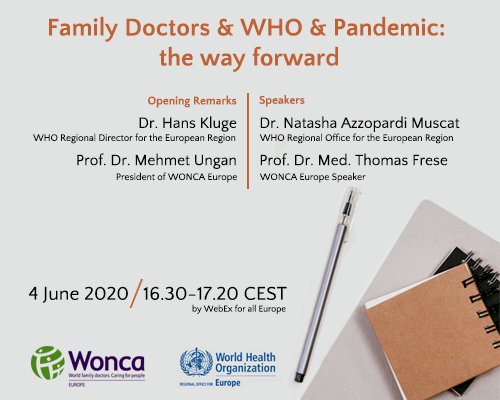Background
The lessons learned from the current COVID-19 pandemic in many places in Europe is that pandemic preparedness is not the only influencing factor for an adequate pandemic response. The emergency response can only go so far if the health system’s first line of defense – primary health care – is alert and up to the task.
There are gaps in front line PHC level: health supplies, such as masks, hand sanitizer and other PPE are lacking. About 16% of all COVID-19 cases reported occurred in health care workers. Shortcomings of the primary health care system, are far more than just about supplies; it is also about organization, scope of practice and prioritization. We all aspire to see a stronger primary health care that would be more like a one stop shop, with trusted nurse or doctor, available and trained to give safer care and answer questions regardless of outbreaks or changes around. Primary health care should be the first place everyone turns to, for health services or information, using hospitals only when truly necessary.
For the occasion of the World Family Doctor Day, celebrated worldwide on 19 May every year, the World Organization of Family Doctors (WONCA Europe) would like in partnership with WHO Europe, to reflect on the role of Family Doctors and the COVID-19 Pandemic and ways to fully unlock the potential of primary health care for responding better to the current pandemic and preparing for disease outbreaks we will inevitably face in the future.
As WONCA Europe & WHO Europe we would like to invite you to a joint WHO/WONCA Europe Webinar open to Family Doctors and other PHC experts, to discuss the vital role of the family physician for a better and stronger PHC in times of COVID-19 and other health threats.
WONCA Europe, the European Regional Branch of WONCA World, is the academic and scientific society for general practice/family medicine in Europe. It represents 47 member-organizations and more than 120,000 family doctors in Europe. WONCA Europe's mission is to improve the quality of life of people through fostering high standards of care in general practice/family medicine. It provides a forum for exchange of knowledge, improving academic education and advocacy for the professional development, research, education and quality improvement of general practice/family medicine.
Objectives
- Exchange actual experiences from the field and the role of Family Doctors in providing primary health care during and after the COVID-19 pandemic
- Explore new ways including the use of emerging technologies helpful to provide safer and more effective care.
- Forward thinking: what can we do better? And how to be prepared?
Expected Outcome(s)
- Refresh and enable a partnership for a joint agenda between WONCA and WHO Europe for a better prepared, responsive and more resilient PHC in times of Pandemics.
- Outline briefly options for transformative agenda towards development of the PHC capacity in the region.
Methodology
Jointly organized WHO/WONCA Europe Webinar
Organizers
- Dr Natasha Azzopardi Muscat, Director of the Division for Country Health Policies and Systems, WHO Regional Office for EURO.
- Professor Dr Mehmet Ungan, President of WONCA Europe.
Audience
Family Doctors and General Practitioners primarily. Other healthcare workers, nurses, residents, and senior medical students may attend as well. Expected > 150 persons
Date, Duration and Venue
4th June 2020 at 16:30-17:20 CEST, by WebEx for all Europe; Duration: 50 minutes
How To Join
Can be watched on the WHO Live Streaming Channel
Program
- Opening Remarks
- Prof Dr Mehmet Ungan, President of WONCA Europe – [5 min]
- Dr Hans Kluge, WHO Regional Director for the European Region – [5 min]
- Challenges facing Family Doctors in Fighting COVID-19: Experiences from the Field
Prof. Dr. med. Thomas Frese, WONCA Europe Speaker – [10 min] - Options for a better PHC Response to Pandemic and other crises: Primary Health Care roles and capacities: Options for System transformation
Dr Natasha Azzopardi Muscat, Director of the Division for Country Health Policies and Systems, WHO Regional Office for EURO – [10 min] - Questions and Answers – [15 min]
- Concluding thoughts –[5 min]

